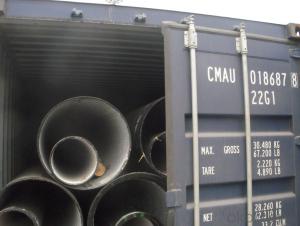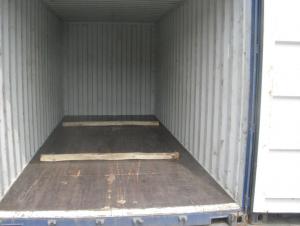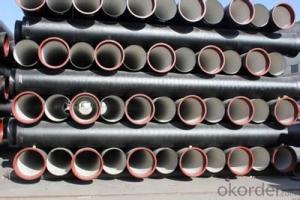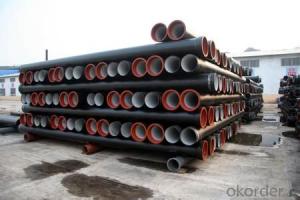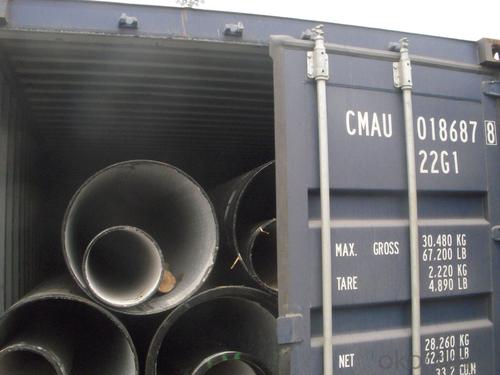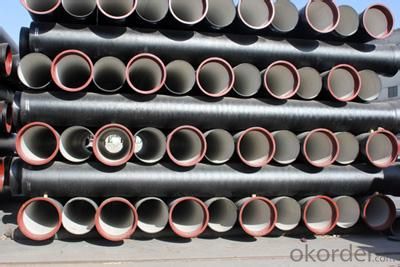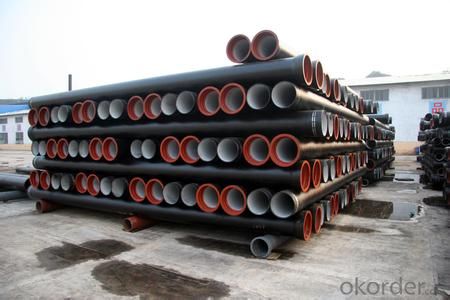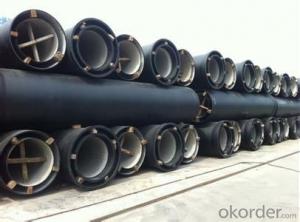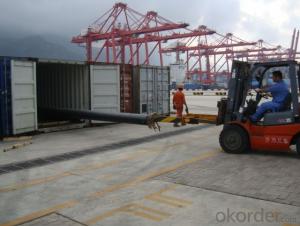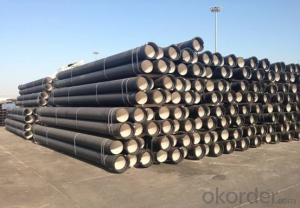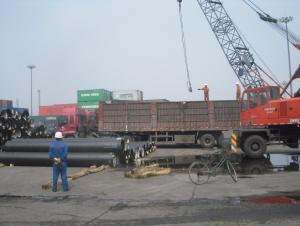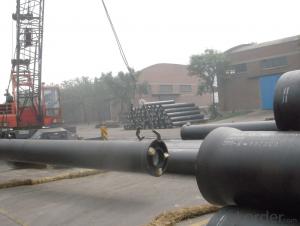DUCTILE IRON PIPES K8 DN800
- Loading Port:
- China Main Port
- Payment Terms:
- TT OR LC
- Min Order Qty:
- -
- Supply Capability:
- -
OKorder Service Pledge
OKorder Financial Service
You Might Also Like
Ductile Iron Cast Pipe is without any defects compare with tradition casting tech, which has many advantages particularly as follow:
(1) High density. In the "vertical upward casting" process, the melt iron of centre liquid column in center crystallizer is continuously feeding for volume shrinkage caused by condensation tube at outer circumference , which lead to be free of shrinkage porosity.
(2) High purity. When melt iron pouring, the mixed impurities such as gas, dross, sand grain which are lighter than melt iron could be eliminated at furnace mouth, its impossible to enter into the crystallizer through the channel, so the melt iron into the crystallizer is very pure.
(3) Strength with toughness. The cooling speed provided by continuous crystallizer is 30 times than sand casting and 5 times than centrifugal casting, and doesn't produce white iron, the eutectic cell volume of continuous cast iron is one eighth to one tenth compare with traditional cast iron. The density of graphite nodule in ductile iron can reach 300-700 pcs/mm2. Therefore, all reason above improve the strength and toughness of continuous cast iron.
(4) Free machining. The high speed cooling make the hardening phase (such as boride, steadite) not appear like reticular, massive or thick, but diffuse like fish bone and pane in shape, moreover, there are tiny graphite flakes inlaid hardening phase. It's free machining in BrinellHardness the range of 250-300HB. However, the Brinell Hardness of 250 is top limit to common metal materials.
(5) Uniform composition of tube wall. The convection mixing of liquid column caused by marching type drawing in crystallizer make the composition of tube wall well-distributed, and concentration gradient very little.
(6) High productivity. To the wall thickness of tube under 10mm, the speed of continuous casting is 1 meter/min, to the wall thickness of tube under 20mm, the speed of continuous casting is 0.5 meter/min, which is high efficiency that centrifugal or other casting tech couldn't reach.
- Q: Are ductile iron pipes suitable for use in irrigation gate systems?
- Indeed, irrigation gate systems can benefit from the use of ductile iron pipes. Ductile iron, a variant of cast iron, boasts superior strength and flexibility, rendering it a reliable and long-lasting option for applications like irrigation gate systems. Ductile iron pipes are famed for their remarkable tensile strength and resistance to corrosion, features that are crucial for preserving the integrity of the irrigation system. Moreover, these pipes can endure high pressure and offer an extended lifespan, making them a cost-efficient solution for irrigation gate systems. In summary, the strength, durability, and corrosion resistance of ductile iron pipes make them highly suitable for use in irrigation gate systems.
- Q: What new technologies are there for the installation of ductile iron pipes?
- The latest installation technology is the use of cast iron pipe special installation tools, a person can be convenient and efficient operation, 5 minutes an interface, very convenient, called cast iron pipe installation tool, you can search.
- Q: Can ductile iron pipes be used for water supply in remote areas?
- Yes, ductile iron pipes can be used for water supply in remote areas. Ductile iron pipes are known for their strength, durability, and versatility, making them suitable for various applications, including water supply systems. These pipes have a high resistance to corrosion and can withstand harsh environmental conditions, making them ideal for remote areas where the availability of maintenance and repair services may be limited. Additionally, ductile iron pipes have a longer lifespan compared to other materials, ensuring the longevity of the water supply system in remote areas. Overall, ductile iron pipes are a reliable choice for water supply in remote areas due to their durability, corrosion resistance, and long lifespan.
- Q: Can ductile iron pipe be used for compressed air systems?
- Yes, ductile iron pipe can be used for compressed air systems. Ductile iron is known for its durability and high strength, making it suitable for handling the pressure requirements of compressed air systems. However, it is important to consider factors such as pipe sizing, pressure ratings, and compatibility with other system components to ensure safe and efficient operation.
- Q: What is the expected internal lining material for ductile iron pipes?
- The expected internal lining material for ductile iron pipes is typically cement mortar lining or polyethylene lining. Cement mortar lining provides a protective coating to the interior surface of the ductile iron pipe, preventing corrosion and extending its lifespan. On the other hand, polyethylene lining is a thermoplastic material that offers resistance to corrosion, abrasion, and chemicals, making it suitable for applications where aggressive substances are present or when the water quality is poor. Both lining materials have their advantages and are commonly used in the industry, depending on the specific requirements and conditions of the project.
- Q: What is the disadvantage of nodular cast iron in excess of silicon?
- Silicon has a great influence on the performance of nodular cast iron. It mainly shows that silicon can refine graphite and improve the roundness of graphite ball.
- Q: Are ductile iron pipes suitable for irrigation canal systems?
- Yes, ductile iron pipes are suitable for irrigation canal systems. Ductile iron pipes are known for their high strength and durability, making them ideal for withstanding the pressure and load requirements of irrigation canal systems. They have a high resistance to external loads, such as heavy machinery, and can handle the stress caused by soil movement and settlement. Additionally, ductile iron pipes are highly resistant to corrosion and provide a smooth inner surface, which minimizes friction and ensures efficient water flow. This is crucial for irrigation systems as it allows for the effective distribution of water to crops, ensuring optimal growth and yield. Ductile iron pipes also have a long service life, typically exceeding 100 years, which makes them a cost-effective option for irrigation canal systems. Their low maintenance requirements further contribute to their suitability for this application. Overall, ductile iron pipes offer the necessary strength, durability, corrosion resistance, and efficiency required for irrigation canal systems, making them a suitable choice for this purpose.
- Q: Can ductile iron pipes be used in gravity sewer systems?
- Yes, ductile iron pipes can be used in gravity sewer systems. Ductile iron is a strong and durable material that is commonly used in various applications, including sewer systems. It has excellent resistance to corrosion and can withstand high pressure and heavy loads. Additionally, ductile iron pipes have a smooth interior surface, which helps to reduce friction and improve the flow of waste and wastewater. Therefore, they are a suitable choice for gravity sewer systems, where the flow of sewage relies on gravity to move through the pipes.
- Q: Can ductile iron pipe be used for hydropower systems?
- Yes, ductile iron pipe can be used for hydropower systems. Ductile iron pipe is known for its strength, durability, and corrosion resistance, which makes it an ideal choice for various applications, including hydropower systems. The high tensile strength of ductile iron allows it to withstand the high pressure and load requirements of such systems. Additionally, its corrosion resistance properties make it suitable for use in water environments, ensuring a long lifespan and minimal maintenance needs. Therefore, ductile iron pipe can be effectively utilized for hydropower systems, providing a reliable and efficient solution for transporting water and supporting the infrastructure of the system.
- Q: What is the average weight of ductile iron pipe?
- The size and thickness of ductile iron pipe can cause fluctuations in its average weight. Typically, smaller diameters of ductile iron pipe weigh around 3.5 pounds per foot, while larger diameters can exceed 20 pounds per foot. It is essential to acknowledge that these weights are rough estimates and might slightly differ depending on the manufacturer and pipe specifications.
Send your message to us
DUCTILE IRON PIPES K8 DN800
- Loading Port:
- China Main Port
- Payment Terms:
- TT OR LC
- Min Order Qty:
- -
- Supply Capability:
- -
OKorder Service Pledge
OKorder Financial Service
Similar products
Hot products
Hot Searches
Related keywords
